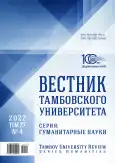Interdisciplinary integration in teaching foreign languages and culture for Master’s Degree Programme of “Economics” and “Management”
- Authors: Rusinova N.V.1, Stepanova M.M.1
-
Affiliations:
- Moscow State Institute of International Relations (Univesity) of the Ministry of Foreign Affairs of the Russian Federation
- Issue: Vol 27, No 4 (2022)
- Pages: 939-951
- Section: THEORY AND METHODS OF FOREIGN LANGUAGE TEACHING
- URL: https://journal-vniispk.ru/1810-0201/article/view/298268
- DOI: https://doi.org/10.20310/1810-0201-2022-27-4-939-951
- ID: 298268
Cite item
Full Text
Abstract
We consider the issue of interdisciplinary integration in teaching at Master’s Degree Programme of “Economics” and “Management”. It explains the important role of foreign languages and culture as the central element of the model of interdisciplinary integration at universities nowadays. It further proves that culture is a key to interdisciplinary integration in language learning of future Master’s Degree Student. Currently, a graduate of Master’s Degree Programme implies both being able to speak a modern language and use the knowledge of languages in working with up-to-date communication technologies when tackling professional tasks and collaborating with colleagues from other countries. Modern federal state education standard for Economics and Management require that Master’s Degree Programmes graduates are competent in the aspect of intercultural communication and know a foreign language at a high level. We suggest a Model of interdisciplinary integration in language teaching at Master’s Degree Programme, which includes target, content, organizational-methodic and perfomance-assessment components. This model implements the main language, culture, humane, innovation, environmental, axiological, valeological, acmeological, aesthetic and other orientations; principles integration and differentiation, continuity and consistency of education. The main purpose of interdisciplinary integration in foreing language teaching at Master’s Degree Programme is to form a well-founded, culturally fullfledged person able to speak a foreign language and operate modern communication technologies. Implementation of interdisciplinary integration in language teaching at Master’s Degree Programme demands coordinated actions of language teachers as well as major disciplines educators.
About the authors
N. V. Rusinova
Moscow State Institute of International Relations (Univesity) of the Ministry of Foreign Affairs of the Russian Federation
Email: n.rusinova@odin.mgimo.ru
ORCID iD: 0000-0002-7143-8427
Candidate of Philology, Acting Head of English Language Department
76 Vernadskogo Ave., Moscow 119454, Russian FederationM. M. Stepanova
Moscow State Institute of International Relations (Univesity) of the Ministry of Foreign Affairs of the Russian Federation
Author for correspondence.
Email: m.stepanova@odin.mgimo.ru
ORCID iD: 0000-0003-0444-8155
Candidate of Pedagogy, Associate Professor of English Language Department
76 Vernadskogo Ave., Moscow 119454, Russian FederationReferences
- Dobrivskaya M.S. Obucheniye delovomu angliyskomu yazyku s rossiyevedcheskim komponentom [Teaching business English Language with Russian-study component]. Vestnik TGPU – Tomsk State Pedagogical Univer-sity Bulletin, 2018, no. 3 (192), pp. 24-27. https://doi.org/10.23951/1609-624X-2018-3-24-27. (In Russian).
- Ziyatdinova Y.N., Valeyeva E.E. Razvitiye navykov mezhkul’turnoy biznes-kommunikatsii mezhdu Rossiyey i stranami Evrosoyuza v inzhenernom obrazovanii [Development of skills of cross-cultural business communica-tion between Russia and the European Union countries in engineering education]. Filologicheskie nauki. Vopro-sy teorii i praktiki – Philology. Theory and Practice, 2017, no. 12-2 (78), pp. 206-209. (In Russian).
- Rathje S. The Definition of Culture: An Application-oriented overhaul. Interculture Journal: Online-Zeitschrift für interkulturelle Studien, 2009, no. 8 (8), pp. 35-58.
- Akhidzhak B.N. Ponyatiye «Kul’tura» kak predmet nauchnogo issledovaniya [Concept of “Culture” as subject of scientific research]. Vestnik Adygeyskogo gosudarstvennogo universiteta. Seriya 2: Filologiya i iskusstvovedeniye – The Bulletin of the Adyghe State University, Series 2 “Philology and the Arts”, 2014, no. 2 (140), pp. 23-27. (In Russian).
- Kuznetsova E.V. Opredeleniye kul’tury: raznoobraziye podkhodov [Definition of culture: diversity of approach-es]. Perspektivy nauki i obrazovaniya – Perspective of Science and Education, 2013, no. 5, pp. 49-54. (In Rus-sian).
- Patterson O. Making sense of culture. Annual Review of Sociology, 2014, vol. 40, pp. 1-30. https://doi.org/ 10.1146/annurev-soc-071913-043123
- Radugin A.A., Radugin K.A. Sotsiologiya [Sociology]. Moscow, Tsentr Publ., 1997, 160 p. (In Russian).
- Giorgetti F.M., Arslan A., Campbell C. Culture and Education: Looking back to Culture Through Education. Routledge Publ., 2020, 204 p. https://doi.org/10.1080/00309230.2017.1288752
- Popova N.V. Mezhdistsiplinarnaya paradigma kak osnova formirovaniya integrativnykh kompetentsiy stu-dentov mnogoprofil’nogo vuza (na primere distsipliny «Inostrannyy yazyk»): avtoref. dis. … d-ra ped. nauk [Interdisciplinary Paradigm as the Basis for the Formation of Integrative Competencies of Students of a Multidisciplinary University (on Example of the Discipline “Foreign Language”). Dr. ped. sci. diss. abstr.]. St. Petersburg, 2011, 50 p. (In Russian).
- Kotlyar M.M. Formirovaniye elementov yazykovoy kul’tury uchashchikhsya pri obuchenii khimii: dis. … kand. ped. nauk [Formation of Elements of the Language Culture of Students in Teaching Chemistry. Cand. ped. sci. diss.]. St. Petersburg, 2000, 176 p. (In Russian).
- Gavrilenko N.N. Mezhdistsiplinarnyy podkhod k obucheniyu otraslevomu perevodu [Interdisciplinary approach to teaching industry-specific translation]. Voprosy metodiki prepodavaniya v vuze – Teaching Methodology in Higher Education, 2019, vol. 8, no. 29, pp. 12-23. https://doi.org/10.18720/HUM/ISSN2227-8591.29.01. (In Russian).
- Kozuliaev A.V. Integrativnaya model’ obucheniya audiovizual’nomu perevodu (angliyskiy yazyk): dis. ... kand. ped. nauk [An Integrative Model for Teaching Audiovisual Translation (English Language). Cand. ped. sci. diss.]. Moscow, 2019, 234 p. (In Russian).
- Henderson J.K. Language Diversity in International Management Teams. International Studies of Management and Organization, 2005, no. 35 (1), pp. 66-82. https://doi.org/10.1080/00208825.2005.11043722
- Dalton M., Chrobot-Mason D. A Theoretical Exploration of Manager and Employee Social Identity, Cultural Values and Identity Crisis Management. International Journal of Cross Cultural Management, 2007, no. 7(2), pp. 169-183. https://doi.org/10.1177/1470595807079382
- Espayeva B.A. Obucheniye studentov ekonomicheskikh spetsial’nostey professional’nomu russkomu yazyku [Training of economic specialties students in professional Russian language]. Innovatsii v nauke [Innovations in Science], 2019, no. 4 (92), pp. 15-17. (In Russian).
Supplementary files








